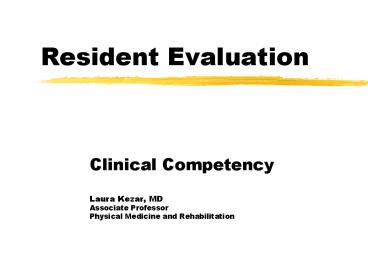Resident Evaluation - PowerPoint PPT Presentation
1 / 24
Title:
Resident Evaluation
Description:
Daily verbal interaction. Correction of errors on H&P's, notes. 360 evaluations. Peer evaluations ... Mini-CEX. Coupled with oral exam ... – PowerPoint PPT presentation
Number of Views:76
Avg rating:3.0/5.0
Title: Resident Evaluation
1
Resident Evaluation
- Clinical Competency
- Laura Kezar, MD
- Associate Professor
- Physical Medicine and Rehabilitation
2
Roles of Oversight Agencies
- ACGME
- Residents in training
- RRC accreditation process
- ABMS
- Initial board certification and maintenance of
certification Groups perceived the need for
developing description of competent physician - Response to external forces
- Errors in Medicine Report, etc.
3
What is Clinical Competency?
- Critical knowledge and ability to perform
defining acts of our profession. - Responsibility of program director and teaching
faculty to verify that residents possess the
skills, knowledge, and attitudes necessary to
competently practice patient care.
4
How Do We Evaluate It?
- Formative Evaluations day to day
- Feedback given to residents on a regular basis to
help them improve performance - Daily verbal interaction
- Correction of errors on HPs, notes
- 360 evaluations
- Peer evaluations
- Reflections on lecture, workshop, committees
- Do not go into the permanent record.
- Portfolios often to show work and document
improvement over time.
5
Daily Feedback
- I see
- give specific information
- I feel
- pleased, disappointed, frustrated
- I think
- this was unprofessional
- you did a great job
- I want
- you to study this tonight and we will re-evaluate
it tomorrow - You should put this in your portfolio
6
How Do We Evaluate It?
- Summative Evaluations
- Formal Global Rotation Evaluations
- Semiannual Global Evaluations
- Evaluation at completion of residency to
specialty board
7
Six Core Competencies1. Patient Care
- Patient care that is compassionate, appropriate,
and effective for the treatment of health
problems and the promotion of health.
8
Six Core Competencies2. Medical Knowledge
- Medical knowledge about established and evolving
biomedical, clinical, and cognate
(epidemiological and social-behavioral) sciences
and the application of this knowledge to patient
care
9
Six Core Competencies3. Practice-based Learning
and Improvement
- Involves investigation and evaluation of
physicians own patient care, appraisal and
assimilation of scientific evidence, and
improvements in patient care
10
Six Core Competencies4. Interpersonal and
Communication Skills
- Interpersonal and communication skills that
result in effective information exchange and
teaming with patients, families, other health
care professionals
11
Six Core Competencies5. Professionalism
- Professionalism, as manifested through a
commitment to carrying out professional
responsibilities, adherence to ethical
principles, and sensitivity to a diverse patient
population.
12
Six Core Competencies6. Systems-based Practice
- Systems-based practice
- manifested by actions that demonstrate an
awareness of and responsiveness to the larger
context and system of health care - ability to effectively call on system resources
to provide care that is optimal value.
13
Typical Evaluation MethodsSee the ACGME Toolbox
- Teaching physician observations
- Written exams
- Learning objectives and evaluations
- Medical record audits
- 360 Evals
14
Evaluation Methods
- Computer simulated patient encounters
- Clinical Evaluation Exercise (CEX)
- Mini CEX
- Standardized patients (Objective Structured
Clinical Examination (OSCE)
15
Learning Objectives and Evaluations
- Supervision of residents by clinically competent
physicians - the ideal assessment site but
difficult to document. - Objectives delineate what resident should be able
to do after completion of rotation. - Learning objectives should span all domains of
learning - cognitive, affective, psychomotor
16
Learning Objectives
- Reasonable, attainable, and measurable
- Should be specific to
- Clinical setting - inpatient or outpatient
- Technical skills needed - ability to perform the
physical exam, injections, EMGs, surgical
procedures
17
Global Faculty Evaluations
- Directly reflect objectives
- Be specific to clinical situations
- Advantages prolonged observation, direct
assessment over time - Disadvantages one shot phenomenon, time
consuming, decreasing time with residents due to
financial constraints, feedback required,
difficult to standardize
18
Additional Evaluation Methods
- Medical record audit
- Checklist looking for documentation of specific
information - Judgment about decision-making
- Can be done longitudinally
- Requires substantial faculty time
- Records do not always reflect what happens in
patient encounters - Improves documentation but not health care
19
Computer Simulated Clinical Encounter
- Computerized patient management problems
- At best, a partial representation of a complete
patient - Must capture key features of interaction
- Benefits exposure to core of disorders,
consistency, detailed feedback - Disadvantages cost, time
20
OSCE
- Benefits consistently display tasks, clinical
task scaled to skills needed to be assessed,
predetermined grading scale - Disadvantages LABOR INTENSIVE, costly
21
Clinical Evaluation Exercise
- Observing a trainee obtaining and performing a
comprehensive history and physical examination on
a new patient - Allowing time to write up case, impression,
management plans - Presentation of case with discussion of findings,
impressions, recommendations - Immediate feedback to trainee
22
Mini-Clinical Evaluation Exercise
- Observation of focused HP
- Discussion of diagnosis and Rx plan
- Eval of performance and feedback
- Total time 20-35 minutes
- More accurately reflects clinical practice
23
Mini-CEX
- 4 areas evaluated
- history
- physical exam
- clinical judgment
- humanistic qualities
- Rating scale used for evaluation
- 4-10 needed for reliability - more needed for
borderline performers
24
Mini-CEX
- Coupled with oral exam
- Could be done at end of each rotation or at end
of academic year - Real patients or trained standardized patients































